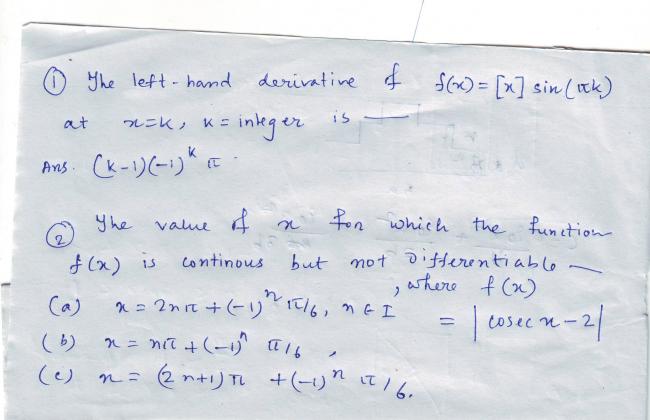Thanks for your valuable help.
3 Answers
Q2. The function is not differentiable when cosec(x) = 2. Accordingly you'll find the general solution.
sin(x) = 1/2
=> sin(x) = sin(pi/6)
=> x = npi + (-1)npi/6
As the function is a composition of continuous functions which are continuous everywhere, so is the overall function.
i think it shud be
LHD =\lim_{h\rightarrow 0}\frac{[k]sin(k\pi )-[k-h]sin(k\pi -h\pi )}{h}
=\lim_{h\rightarrow 0}\frac{ksin(k\pi )-(k-1)sin(k\pi -h\pi )}{h}
=\lim_{h\rightarrow 0}\frac{k(sin(k\pi )-sin(k\pi -h\pi ))+sin(k\pi -h\pi )}{h}
=k\pi cos(k\pi ) +\lim_{h\rightarrow 0}\frac{sin(k\pi -h\pi )}{h}
now cos(k pi ) = -1 for k =1 ,3,5,..
= 1 for k = 0,2,4 ..
thus cos(k pi ) = (-1)k
also sin(k\pi -h\pi )= sin(h\pi)\; for \; k= 1 ,3,5,..
sin(k\pi -h\pi )= sin(-h\pi)\; for \; k= 0,2,4..
so sin(k\pi -h\pi )= sin((-1)^{k-1}h\pi)
so LHD=k\pi cos(k\pi ) +\lim_{h\rightarrow 0}\frac{sin(k\pi -h\pi )}{h}
=(-1)^{k}k\pi +\lim_{h\rightarrow 0}\frac{sin( (-1)^{k-1}h\pi )}{h}
=(-1)^{k}k\pi + (-1)^{k-1}\pi =(-1)^{k}k\pi - (-1)^{k}\pi
=(-1)^{k}k\pi + (-1)^{k-1}\pi =(-1)^{k}(k-1)\pi
